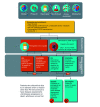FIGHT-302: first-line pemigatinib vs gemcitabine plus cisplatin for advanced cholangiocarcinoma with FGFR2 rearrangements
- PMID: 32677452
- PMCID: PMC9892961
- DOI: 10.2217/fon-2020-0429
FIGHT-302: first-line pemigatinib vs gemcitabine plus cisplatin for advanced cholangiocarcinoma with FGFR2 rearrangements
Abstract
FGFR2 rearrangements resulting in dysregulated signaling are drivers of cholangiocarcinoma (CCA) tumorigenesis, and occur almost exclusively in intrahepatic CCA. Pemigatinib, a selective, potent, oral inhibitor of FGFR1-3, has demonstrated efficacy and safety in a Phase II study of patients with previously treated locally advanced/metastatic CCA harboring FGFR2 fusions/rearrangements. We describe the study design of FIGHT-302, an open-label, randomized, active-controlled, multicenter, global, Phase III study comparing the efficacy and safety of first-line pemigatinib versus gemcitabine plus cisplatin in patients with advanced CCA with FGFR2 rearrangements (NCT03656536). The primary end point is progression-free survival; secondary end points are objective response rate, overall survival, duration of response, disease control rate, safety and quality of life. Clinical Trial Registration: NCT03656536 (ClinicalTrials.gov).
Keywords: FGFR; INCB054828; cholangiocarcinoma; pemigatinib.
Figures
References
-
- Mukkamalla SKR, Naseri HM, Kim BM, Katz SC, Armenio VA. Trends in incidence and factors affecting survival of patients with cholangiocarcinoma in the United States. J. Natl Compr. Canc. Netw. 16(4), 370–376 (2018). - PubMed
-
- Bertuccio P, Malvezzi M, Carioli G et al. Global trends in mortality from intrahepatic and extrahepatic cholangiocarcinoma. J. Hepatol. 71(1), 104–114 (2019). - PubMed
Publication types
MeSH terms
Substances
Associated data
Grants and funding
LinkOut - more resources
Full Text Sources
Medical
Miscellaneous

